HOME > Japan SPOTLIGHT > Article
Ugly American Diplomacy: Donald Trump & the Art of the Deal
By Constantine A. Pagedas
The 1958 bestseller by Eugene Burdick and William J. Lederer, The Ugly American, was a damning critique of the US foreign policy establishment at the height of the Cold War. Set in the fictional nation of Sarkkan in Southeast Asia, the book was published just prior to the ramping up of America's involvement in Vietnam under President John F. Kennedy and was an extended metaphor which highlighted many of the character flaws of the elitist US diplomatic corps. As one of the book's characters, a Burmese journalist, famously observes, "For some reason, the [American] people I meet in my country are not the same as the ones I knew in the United States. A mysterious change seems to come over Americans when they go to a foreign land. They isolate themselves socially. They live pretentiously. They are loud and ostentatious." The book captured the international mood of the mid-20th century and the term "ugly American" came to describe more generally the arrogant, culturally-insensitive, money-loving, and indeed, nationalistic, behavior of America's growing jet-set.
The hit to America's reputation at the time certainly created a great deal of concern in Washington's foreign policy circles, especially as the US was engaged in a superpower competition with the Soviet Union to win the hearts and minds of people around the world. Kennedy thought so much about the book's impact on international perceptions of the US that the idea of having a Peace Corps, for example, became a key platform during his 1960 presidential campaign and one of the first major accomplishments of his presidency when he announced its creation on March 2, 1961.
Today, however, there appears to be little concern within the administration of President Donald Trump about the reputation of the US. Trump, who in his inaugural speech vowed to put "America First", has publicly rebuked the foundations of US foreign policy that have been carefully and painstakingly developed by previous administrations over the past seven decades (Photo 1). Arrogant, loud, and ostentatious - even by American standards - Trump's diplomacy during his first year in office has been characterized by a diminution of the US foreign policy establishment alongside a redirection of American diplomatic priorities.
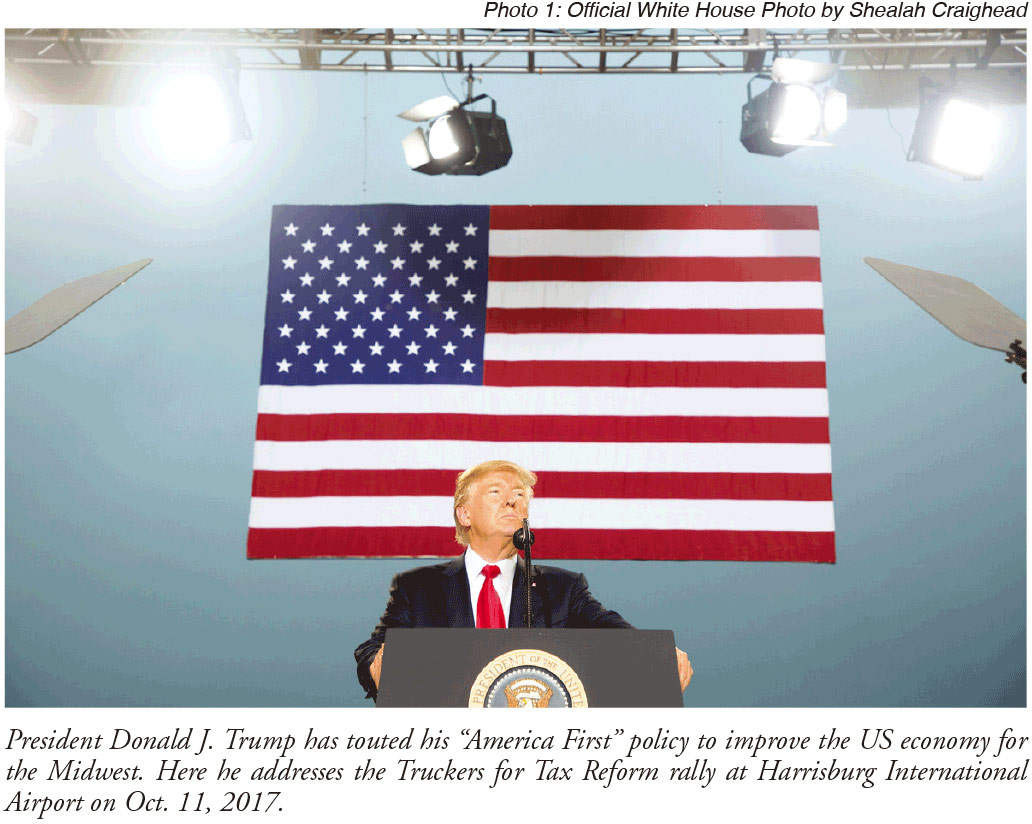
Two major areas where Trump appears to be rewriting the playbook for US foreign policy are in the renegotiation of existing trade deals and the war of words that has erupted over the development of North Korea's nuclear weapons and ballistic missile capabilities. In turn, the US relationship with its primary strategic competitor, China, has hit an important inflection point. Through the first year of his presidency, Trump's "ugly American" diplomacy is setting a negative tone with respect to the US role in the world, the effects of which will likely be felt for some time to come.
Draining the Swamp at Dizzying Speed
While running for president in 2016, one of the key phrases Trump often repeated in his stump speeches was that, if elected, he would come to Washington and "drain the swamp". This phrase was deliberately used to attract white middle-class voters in the upper Midwest of the US who saw in candidate Trump a man who would go after the political establishment in Washington and its bloated bureaucracy.
Washington, Trump said, was responsible for the loss of manufacturing jobs in the "Rust Belt" states of Wisconsin, Michigan, Ohio and Pennsylvania. Indeed, both Republicans and Democrats from Congress and the Executive branch, so his argument went, all had a hand in the development of free trade agreements and "bad deals" that opened the US to cheaper products manufactured by less regulated economies. Major US manufacturers in turn shuttered their factories in the US in favor of opening new production facilities in countries such as Mexico, taking advantage of the lower cost of Mexican labor and the removal of trade barriers. Following the 2008 "Great Recession", most Midwestern blue-collar workers did not experience the economic recovery that followed as quickly or as fully as their white-collar counterparts on the East or West coasts. For the first time in modern American history, the rural, white middle-class of the US saw their long-term economic prospects in terminal decline, exacerbated by sharply rising costs in education and health care. In 2016, Trump had successfully tapped into this resentment for his own political purposes.
From the start of his presidency, Trump set out to reshape the Washington establishment. For most conservative, rural Americans from the Midwest who formed the backbone of Trump's political support, few Washington institutions evoke the perception of wealthy Ivy League privilege and liberal East Coast elitism more than the US State Department. It was therefore no surprise that this department would be particularly hard hit by Trump's decision to impose a hiring freeze for the US government while his first budget request for FY 2018 would significantly cut funding for the State Department from the $54.9 billion estimated total in fiscal 2017 to $37.6 billion in fiscal 2018 - a reduction of $17.3 billion, or 31%.
Except for the most ardent Trump fans in Washington, the request for draconian cuts was considered "dead on arrival". While the director of the Office of Management and Budget in the White House, Mick Mulvaney, tried to justify the proposed cuts to the US media, saying that "The president ran saying he'd spend less money overseas and more money at home," both Democrats and Republicans in Congress called the cuts "irresponsible" saying they would harm US diplomacy and by extension compromise US diplomatic security. This was an especially strong argument considering Trump and the Republican Party consistently accused Hillary Clinton during the 2016 election of not doing enough while she was secretary of state to ensure diplomatic security at the US compound in Benghazi, Libya, where on Sept. 11, 2012, newly appointed US Ambassador Christopher Stevens and three other US personnel were murdered by members of the Islamic militant group Ansar al-Sharia.
To be sure, Trump's budget request for the State Department irked some key moderate Republicans. Senator Lindsey Graham of South Carolina, the chairman of the Senate Appropriations Subcommittee on the State Department and Foreign Operations, openly rejected the cuts, observing "If we implemented this budget, we'd have to retreat from the world and put a lot of people at risk" and highlighting that there would be "a lot of Benghazis in the making if we actually implemented the State Department cuts" (Photo 2). Even retired Marine General James Mattis, Trump's own secretary of defense, whose department financially stood to benefit the most from the proposed cuts, recognized them for what they were and argued for the restoration of funding - even if only to relieve the increased pressure on the US military which would invariably be called upon to intervene in the world more without US diplomats in place.
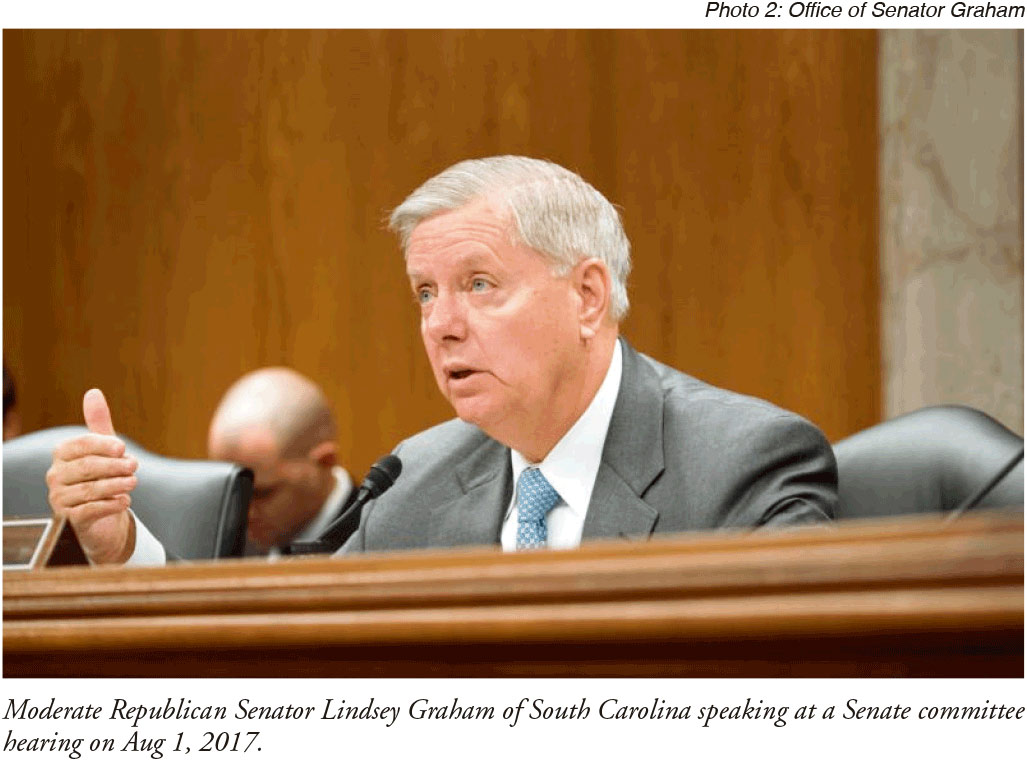
Even though it appears likely that funding will be restored to 2017 levels once a budget is passed, the Trump administration has also hurt the State Department in other ways. It has delayed filling key senior positions or nominating ambassadors at the same time as Secretary of State Rex Tillerson has been given the task of reorganizing the department. As of November 2017, the Trump administration has filled only 57 appointments out of a total of 187 ambassadorial positions. And besides Tillerson and his immediate deputy secretary, John Sullivan, the Senate has confirmed only seven political appointees for senior State Department positions, while 39 positions remain vacant and 18 positions are in line to be eliminated.
With all this, there has been a perceptible drop in morale at Foggy Bottom as bureaucratic attrition has set in. As the president of the American Foreign Service Association, Ambassador Barbara Stephenson poignantly observed at the end of 2017, "there is simply no denying the warning signs that point to mounting threats to our institution - and to the global leadership that depends on us. There is no denying that our leadership ranks are being depleted at dizzying speed." Indeed, besides the rapid loss of experienced career diplomats and State Department personnel in 2017, it is too soon to determine the long-term consequences regarding the hiring freeze and the drop in applications by young, newly-minted graduates who wish to enter a career in the US Foreign Service (Photo 3). But while the State Department clearly seems to be losing its leadership role within the US foreign policy establishment, many of its traditional responsibilities are in fact being filled by Trump himself.
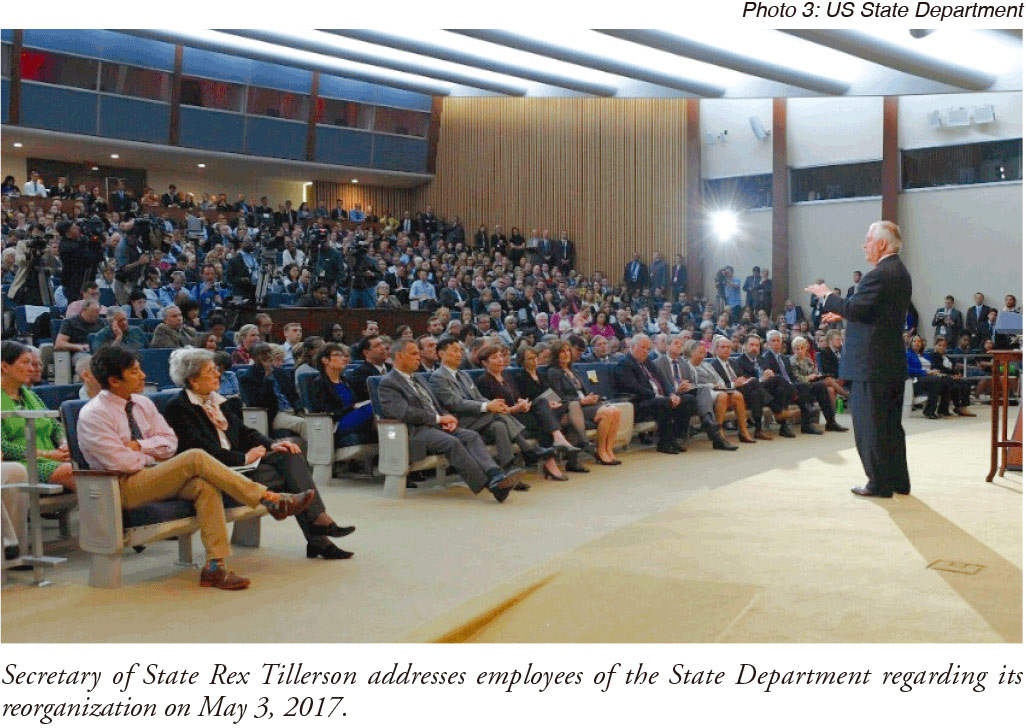
Salesman-in-Chief
As the longtime head of the privately-held Trump Organization, Donald Trump's background and experience in property development and the marketing of Trump products means that as a businessman, the focus of his attention was on the making of money for himself personally, and not on increasing value for shareholders which would be the case for publicly-traded companies. Indeed, Trump's first and only foray into the world of publicly-traded companies in the mid-1990s, Trump Hotels and Casino Resorts, ended in disaster for those who bought shares in his company. After less than a decade of operation, Trump's publicly-traded company lost nearly all shareholder value and filed for bankruptcy at a time when other casinos were highly profitable. As widely reported at the time, Trump greatly enriched himself through the Trump Hotels and Casinos, which paid to have his personal jet piloted and which purchased massive amounts of Trump-brand merchandise from his privately-held organization.
This was widely forgotten or ignored when Trump was running for president in 2016. Instead, candidate Trump ran on his image as a successful businessman, telling voters that he could improve the economy because he was a tough negotiator who could make "good deals" for the US. On the campaign trail, he castigated his opponent Hillary Clinton for her role in negotiating the Trans-Pacific Partnership (TPP) because it was a bad deal for the US and would further harm US manufacturing that had already felt the negative effects of the North American Free Trade Agreement (NAFTA), the Korean-US free trade agreement (KORUS) and other pacts which opened foreign markets to US products, but also saw the US market exposed to cheaper products from various overseas manufacturers.
In 2017, Trump initiated a significant change in the way the US would conduct its overall foreign policy. In his inaugural speech, he repeatedly emphasized that his administration would be guided in all policy decisions by the central concept of "America First", stating that "Every decision on trade, on taxes, on immigration, on foreign affairs, will be made to benefit American workers and American families." Three days later, Trump initiated the United States' formal withdraw from the TPP, calling it a "disaster". Henceforth, the US would eschew multilateral free trade arrangements and "begin pursuing, wherever possible, bilateral trade negotiations to promote American industry, protect American workers, and raise American wages." The problem with this approach, however, is that true to his CEO background, Trump has also ensured that he would in effect become his own secretary of state, always reserving the right to publicly contradict Tillerson or other members of his Cabinet in order to personally decide what he believed to be in America's interest.
In his first year in office, Trump has consistently been at odds with the various business groups, key members of Congress, and even members of his own Cabinet in terms of fulfilling his America First promise. His "Trade Policy Agenda" of March 1, 2017 highlighted that his "overarching purpose" and "guiding principle" would be to "expand trade in a way that is freer and fairer for all Americans." He has appointed Commerce Secretary Wilbur Ross and the US Trade Representative Robert Lighthizer to take a firm approach with US trading partners designed to break down what he sees as "unfair trade barriers", to develop more balanced trade relations with countries that the US is running a deficit with, and to update existing trade agreements in a way that provides greater protections for America's manufacturing base.
In late April 2017, an internal controversy erupted within the White House regarding how far and how fast the Trump administration would move on reopening negotiations on existing free trade agreements, or whether the US would simply withdraw from agreements the president himself saw as harming US interests. It began when the US media reported that the director of the Office of Trade and Manufacturing Policy, Peter Navarro, and then White House Chief Strategist Steve Bannon had drafted an Executive Order simply withdrawing the US from NAFTA that was ready for Trump's signature. That Trump let it be known he was willing to end NAFTA without any study of its potential consequences for the US at the stroke of his pen set off alarm bells throughout Washington. In the end, it was up to both Ross and Tillerson to argue for a more measured approach and reportedly they convinced Trump at the eleventh hour of a strategy to try and renegotiate the NAFTA agreement first without terminating the deal.
As a result, in August 2017, US, Canadian and Mexican trade representatives began what will be a total of seven rounds of negotiations to update NAFTA. Through the first five rounds, negotiations have reportedly been contentious, with Mexico and Canada opposing several controversial US proposals. The Trump administration's suggestion for higher US and NAFTA country content requirements for the auto sector, as well as the introduction of the idea of a "sunset clause" requiring the renewal of the NAFTA agreement every five years, has caused some consternation in the US business community and among most members of Congress. While some observers have begun to express doubts over whether negotiators can finalize an agreement and pass it through their respective legislatures, the US, Canada, and Mexico have already agreed to delay discussions for the still more difficult remaining rounds, and to postpone final negotiations until February or March 2018 (Photo 4).
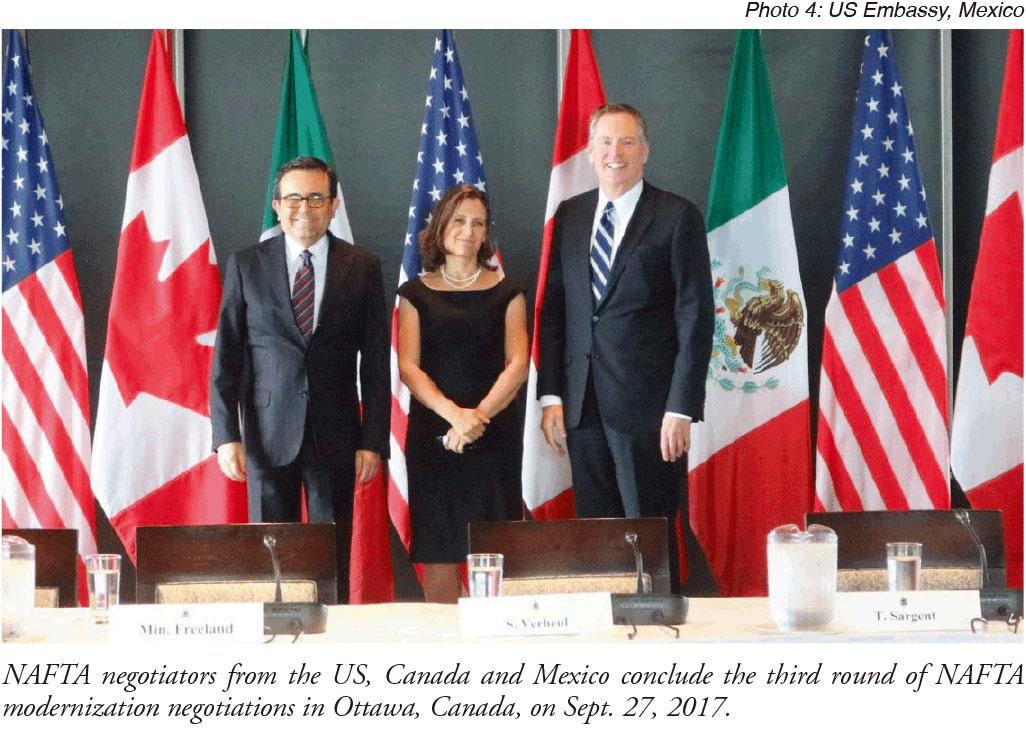
Similarly, the US attempt to renegotiate KORUS with South Korea has also made no substantive progress. During their first round of meetings in late August 2017, US negotiators pressed their South Korean counterparts to fix the US trade deficit and reform regulations that undermine US businesses. Lighthizer reportedly provided South Korea's chief negotiator Kim Hyun-chong with 40-50 demands for South Korean concessions aimed at reducing the US trade deficit. Kim firmly rejected Lighthizer's demands, stating that the two sides must first conduct a joint study of the causes of the trade deficit before the two countries could engage in the renegotiation of KORUS.
Trump saw Seoul's position following the first meeting as a clear sign that South Korea was simply going to stonewall the US. Again, he took an extreme position in early September and instructed his advisers to make preparations for the US withdrawal from KORUS. Again, he was forced to back down from his initial reaction, this time when key Congressional leaders and certain members of the US business community voiced their strong concerns, along with Defense Secretary Mattis and National Security Advisor General H. R. McMaster. While a bipartisan group of Senators and Congressmen led by Republican Senator Orrin Hatch of Utah released a joint statement defending KORUS, the US beef and dairy industries, two of the Midwest's largest employers that have seen exports surge to South Korea since KORUS was implemented, were particularly vocal in their opposition to Trump's threat to withdraw. Few in Washington also saw any benefit in damaging US-South Korean relations while Seoul was at the same time facing the military threat from North Korea, which had been conducting a series of tests of its ballistic missile capabilities over the summer and, significantly, had just tested its first thermonuclear bomb on Sept. 3. The US withdrew most of its demands of South Korea in the second round of talks.
In his first year in office, Trump's foreign policy has focused on the announcement of a large number of business deals that were signed during various state visits. In May 2017, when Trump visited Riyadh, US and Saudi business executives signed a wide range of deals reportedly worth more than $350 billion. This included an arms deal package totaling $110 billion and involving major US defense companies such as Lockheed Martin, Boeing, Raytheon and General Dynamics to develop and improve numerous Saudi military capabilities. The Blackstone Group and the Saudi Public Investment Fund also signed a deal to invest up to $100 billion in infrastructure projects, focused mainly in the US, along with other bilateral agreements for business development in the Saudi energy and petrochemical sectors (Photo 5).
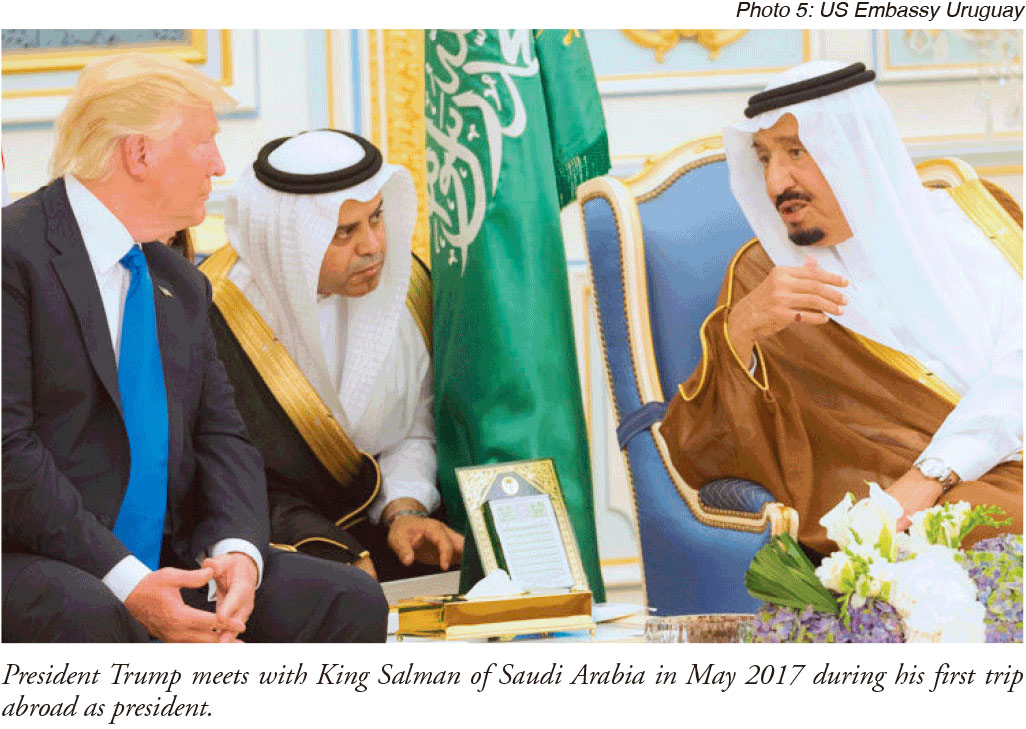
While the president grabbed headlines because of the potential boon to several major US companies, many of the individual arms deals had already been finalized in 2016 under the administration of President Barack Obama, while several other schemes were merely statements of intent rather than guaranteed projects. The Trump delegation, however, was primarily focused on making the announcement of sales, new partnerships with various Saudi entities, and other bilateral business arrangements (along with the large potential amounts involved). According to one report, the president's son-in-law, Jared Kushner, personally telephoned the president and CEO of Lockheed, Marillyn Hewson, asking that her company lower the cost of its anti-missile system.
"Fire and Fury"
The year 2017 has been one of significant progress for North Korea's missile and nuclear weapons programs which has presented the Trump administration with a particularly thorny problem. Kim Jong Un's regime has fired 23 missiles during 16 tests since Trump took office in January. In addition, Pyongyang conducted its sixth nuclear test on Sept. 3, claiming it to be its first successful hydrogen bomb. While most experts currently believe the North Korean regime has not developed the operational capability to deliver a missile beyond Asia, some experts including a former director of the Central Intelligence Agency, Michael Hayden, have observed that if Pyongyang continues at its current pace of testing, it might be able to develop an indigenous missile with a North Korean-built nuclear warhead that could reach the continental US before the end of Trump's first term (Photo 6).
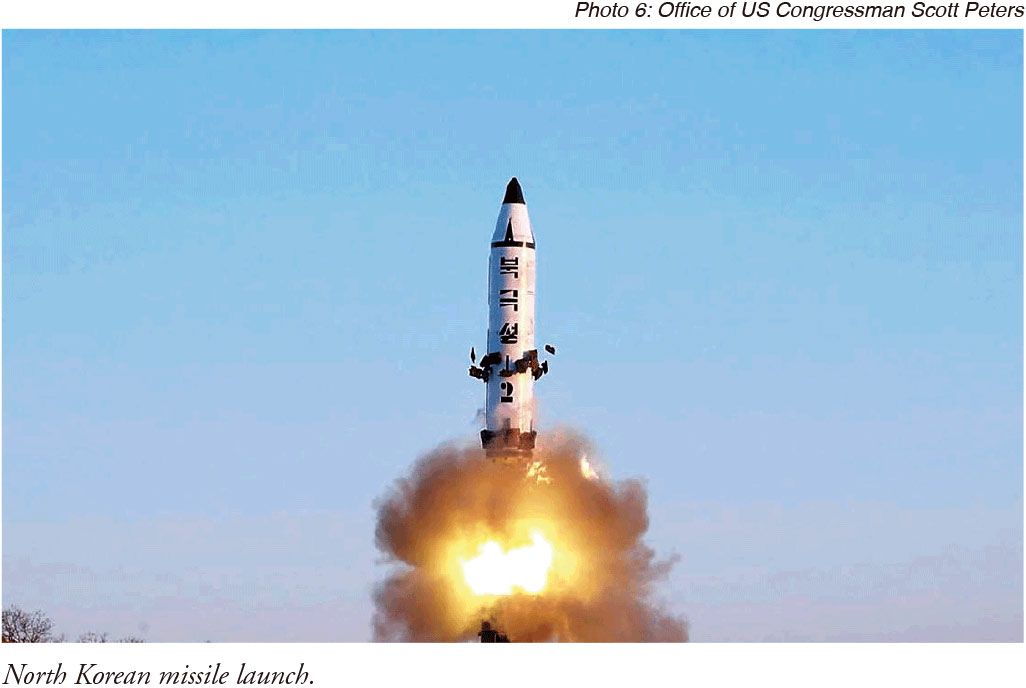
So when the United Nations Security Council unanimously strengthened its sanctions regime against North Korea in response to its July 28 missile test, largely due to the hard work and good offices of US Ambassador to the UN Nikki Haley, it was more than a little surprising that Trump chose to respond to Pyongyang's threats against Washington - threats that the North Korean regime had made many times before but that had been ignored by previous presidents. Sitting at a conference table during vacation at his golf resort in Bedminster, New Jersey, with his arms folded and surrounded by members of his Cabinet, Trump tried to project an image of strength and began a war of words with Kim Jong Un, saying that "North Korea best not make any more threats to the United States. They will be met with fire and fury and frankly power the likes of which the world has never seen."
The American president easily fell into Kim's diplomatic trap. By making a forceful public response, Trump indulged the young dictator's singular desire to be taken seriously by Washington and fed Pyongyang's propaganda machine that the US was bent on North Korea's ultimate destruction - and therefore North Korea needed to redouble its efforts in developing its nuclear weapons and missile capabilities, whatever the cost. What is perhaps most interesting with respect to the US-North Korea confrontation to this point is that both Trump and Kim have personalized this diplomatic crisis through name-calling and insults in their public comments. North Korea's leader has called Trump "a frightened dog", "a gangster fond of playing with fire", and in an unusually odd statement, a "mentally deranged US dotard" - an English term not often used meaning old and senile. For his part, Trump has called Kim "Little Rocket Man" and "short and fat" (Photo 7).
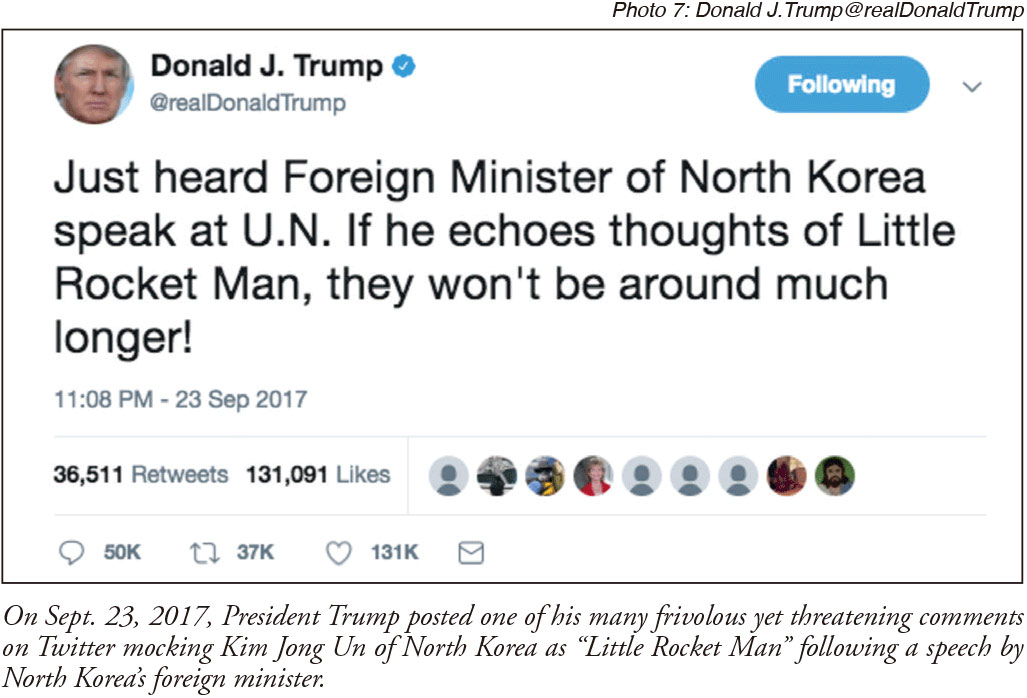
The State Department is continuing to work as best it can with friends and allies in the region, as well as with counterparts in Beijing and Moscow, on the imposition and enforcement of two new sets of UN sanctions against North Korea, banning its exports of coal, iron, lead, and seafood, as well as limiting its imports of crude oil and refined petroleum products. Foggy Bottom has also been stretched in enforcing a new set of US sanctions and Trump's Executive Order cutting the US financial system off from any companies, organizations, or individuals found to being doing business with North Korea.
But what makes the Trump-Kim confrontation so dangerous is that if the playground insults between these leaders continue, the situation could see the two men backing themselves into positions where one might need to save face against the other, which in turn could potentially lead to a military conflict involving nuclear weapons. And because there is no official government-to-government relationship between Washington and Pyongyang, the intentions of both countries are communicated through public statements, social media, military exercises, or intermediaries - such as China and Russia - which also opens up a greater possibility for miscommunication and miscalculation. So, a successful resolution to this North Korean crisis is going to depend upon the subordinates in both governments to help guide their leaders.
Trump, however, has consistently overruled his foreign policy team. In the immediate aftermath of his "fire and fury" comments, for example, Tillerson was at pains to stress to the international community that the threat level presented by North Korea had not changed and that "Americans should sleep well at night." It certainly was odd and confusing to see over the summer the president's intent on ratcheting up the rhetoric with North Korea while his secretary of state was trying to tamp it down. Inevitably, Trump pulled rank and communicated to his secretary of state over Twitter, telling him to "stop wasting his time trying to negotiate with Little Rocket Man...Save your energy Rex, we'll do what has to be done!"
But Trump undermines his own foreign policy when he takes to Twitter to insult or militarily threaten Pyongyang at the same time that his own government is trying to give sanctions a chance to work. The combination of sanctions and strong rhetoric confuses the situation because the sanctions are meant to change behavior, while Trump's threats of the complete destruction of North Korea conveys the message that Washington may indeed try to overthrow or destroy the regime. Moreover, any potential diplomatic climb down or negotiation to curb or eliminate North Korea's nuclear weapons and ballistic missile programs has been complicated by Trump's Oct. 13 announcement to decertify Iranian compliance with the Joint Comprehensive Plan of Action (JCPOA), the controversial Iran nuclear deal negotiated by the Obama administration postponing the development of Iran's nuclear weapons program. Although Trump stopped short of withdrawing from the agreement, the decision has been put in Congress' lap to determine whether to impose "snap back" sanctions suspended under the JCPOA and effectively terminate the agreement. The Trump administration's approach to Tehran and its retreat from the JCPOA has not likely been lost on Pyongyang, making any possible future negotiated settlement with North Korea even more difficult.
Indeed, Trump's impulsive behavior along with the confusing and contradictory diplomatic state of affairs he has created has not been lost on Congress either. So concerned that Trump was leading the US "on the path to World War III", retiring Republican Senator Bob Corker of Tennessee, the chairman of the Senate Foreign Relations Committee who has fallen out of favor with the Trump White House, held hearings on Nov. 14 to examine the president's authority to launch nuclear weapons and to determine whether Trump's senior advisers - the so-called "grown-ups in the room" such as Mattis, Tillerson, and McMaster - should have a formalized role in the chain of command to launch nuclear weapons (Photo 8).
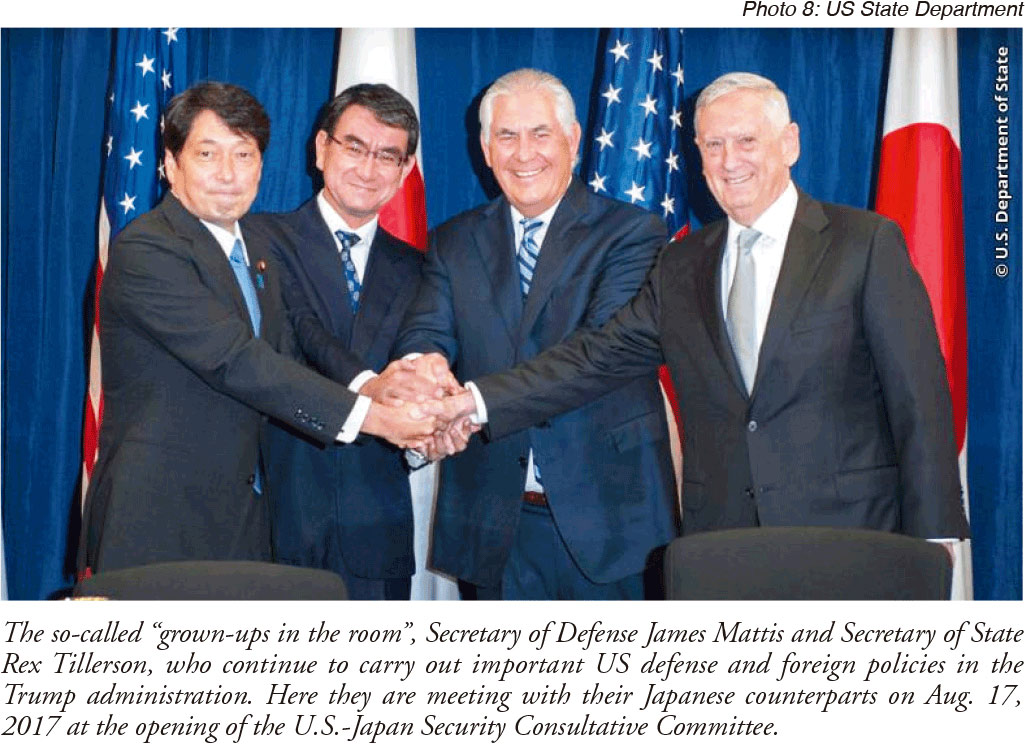
From the Midwest to the Middle Kingdom
And so this brings us to China - the country which since 1989 has displaced the US as the world's leader in manufacturing, the country with which the US ran a $347 billion trade deficit in 2016 accounting for over 40% of its entire trade deficit with the rest of world, the country whose central bank sat on over an estimated $3 trillion dollars in foreign cash reserves in 2017, the country which has embarked on an assertive global economic and political expansion with its "One Belt, One Road" initiative, the country which has been building man-made islands in the South China Sea along with military bases in the Indian Ocean to project its military power beyond its immediate coastal region, and the country which has been critical to the survival of the rogue North Korean regime. On the campaign trail and through much of his first year in office, Trump has criticized China on numerous bilateral and regional issues including unfair trade practices, its alleged currency manipulation, the militarization of the South China Sea, and its procrastination in bringing North Korea to heel following its missile and nuclear weapons tests. Certainly his position on all of these issues, but especially China's alleged unfair trade practices, were what made the billionaire New York businessman so politically appealing to his Midwestern base of support.
Yet, Trump's diplomacy with respect to China has been enigmatic. On the one hand, it was mildly surprising that Trump optimistically declared "tremendous progress" on trade and North Korea even though he also admitted he received nothing at his first meeting with President Xi Jinping on April 7 at his Mar-a-Lago resort in Florida. On the other, Trump's patience with China appeared to have worn thin over the summer in the aftermath of another North Korean missile test when he tweeted that "I am very disappointed in China. Our foolish past leaders have allowed them to make hundreds of billions of dollars a year in trade, yet they do NOTHING for us with North Korea, just talk. We will no longer allow this to continue. China could easily solve this problem!" (Photo 9). In any event, Trump certainly had no problem announcing unguaranteed, non-binding and politically sensitive deals in US energy infrastructure and the sale of Boeing commercial aircraft, among others, totaling $250 billion at their second bilateral meeting in November. Again, Trump's short-term focus on deals stands in sharp relief to the long-term, and some would say more responsible, view Xi has been broadcasting to the people of China and indeed the world in 2017.
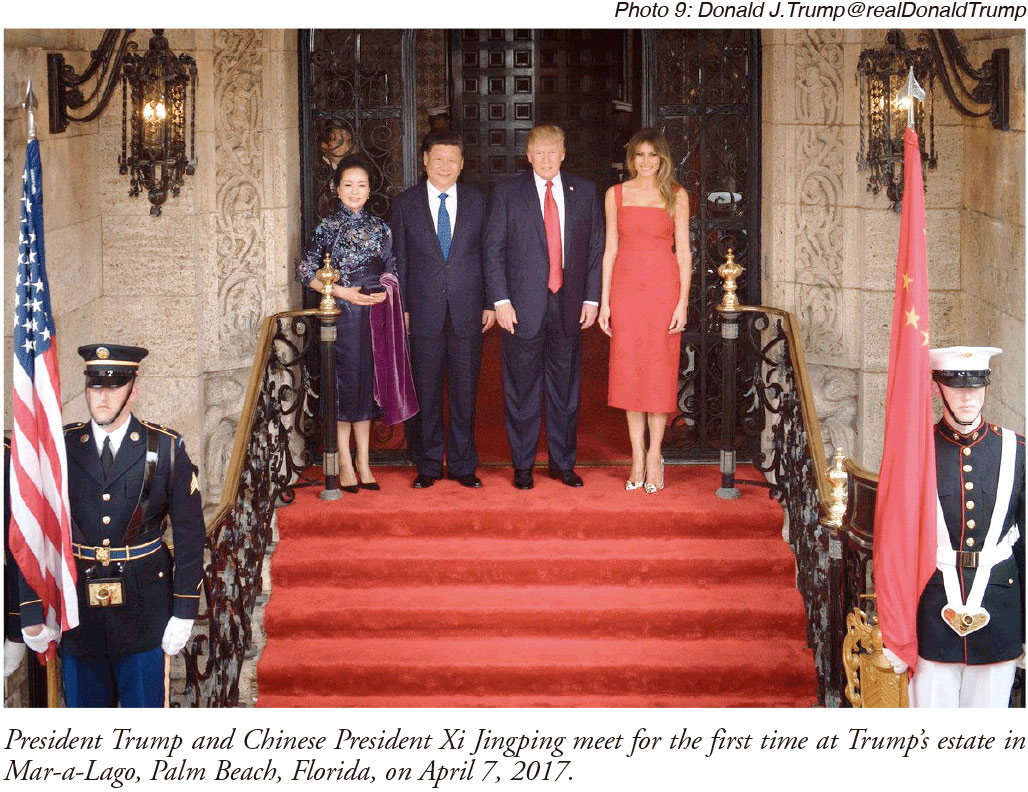
Perhaps at no time since the peak of the Ming dynasty has the international perception of China's growing power on the world stage been more secure than on Oct. 18 when Xi spoke at the Great Hall of the People in Beijing at the 19th Communist Party Congress. During his three and a half hour speech, Xi presented a confident China that had finally arrived at this "new historic juncture in China's development". He said his country was now "a mighty force" that could lead on a wide range of political, economic, military and even environmental issues around the world, continuing that "The Chinese nation ... has stood up, grown rich, and become strong - and it now embraces the brilliant prospects of rejuvenation ... It will be an era that sees China moving closer to center stage and making greater contributions to mankind."
In addition, Xi contrasted China with the US and Trump's brashness when he described his country as a responsible global power that was committed to international cooperation to address common dangers such as climate change, observing "No country alone can address the many challenges facing mankind. No country can afford to retreat into self-isolation." (Photo 10).
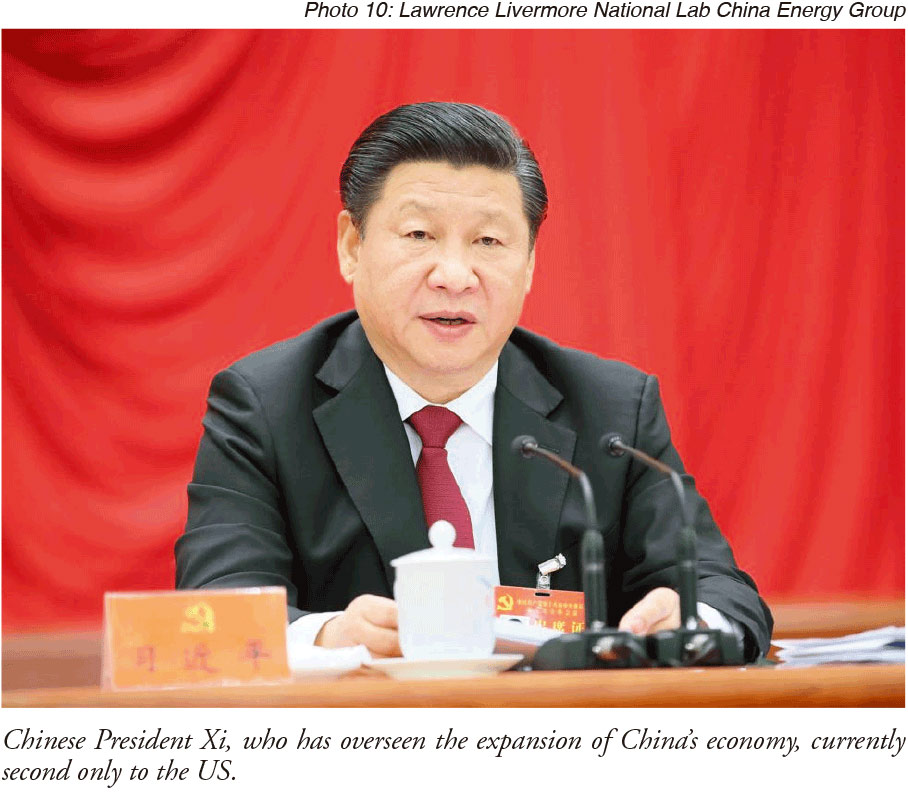
At the annual Asia-Pacific Economic Cooperation (APEC) forum in Da Nang, Vietnam, on Nov. 10, Trump and Xi laid out significantly different visions for the future of the global economy in their back-to-back speeches. Trump outlined his protectionist "America First" agenda, vowing "We are not going to let the United States be taken advantage of anymore" and warning that "I am always going to put America first the same way I expect all of you in this room to put your countries first." Moreover, he harshly accused the World Trade Organization of failing to monitor and address free trade violations by allowing some countries to get away with what he deemed "chronic trade abuses" (Photo 11).
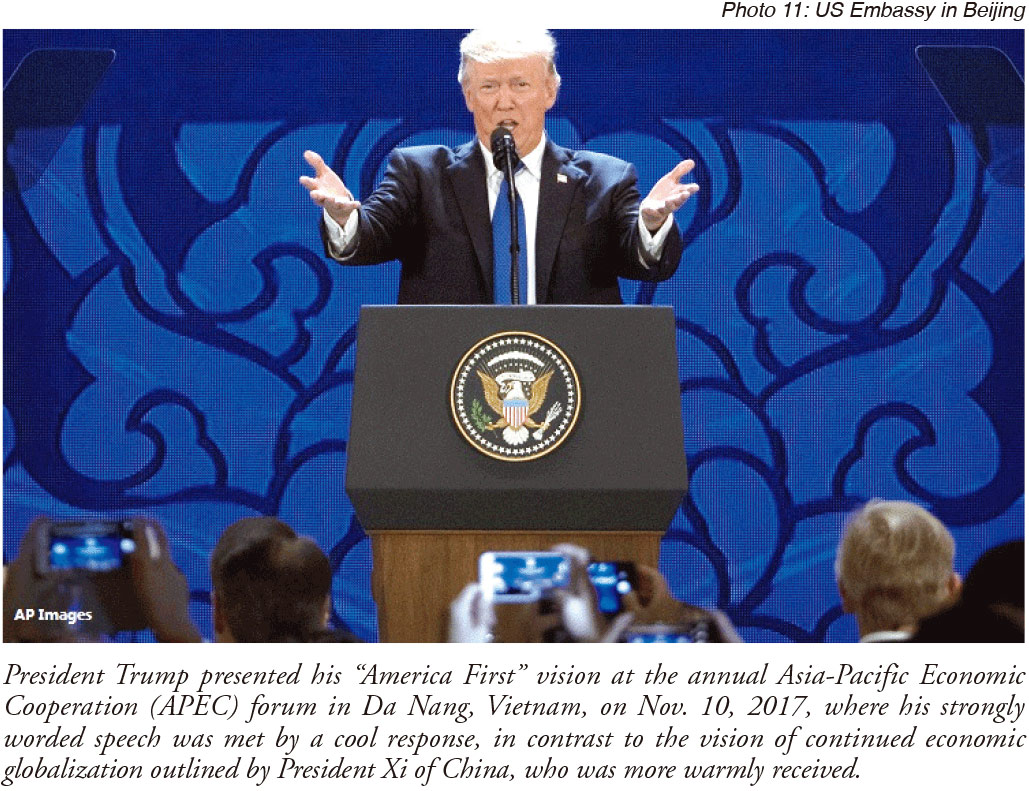
Xi on the other hand took a more conciliatory tone, defending the "irreversible" tide of economic globalization. In pursuing this, the Chinese leader calmly expounded, "We should make it more open, more inclusive, more balanced, more equitable and more beneficial to all." As a polite, yet deliberate, swipe at Trump's speech, Xi noted that "Openness brings progress while self-seclusion leaves one behind." The contrast between the two men and the projection of their own country's role in the world could not have been more evident, and the audience which heard both men speak clearly favored the Chinese vision of the future global economy over the American.
Trump & the Art of Ugly American Diplomacy
Today, Beijing sits poised to dominate the 21st century, while its strategic competitor has been caught up in an internal struggle begun by a president whose natural inclination is to take the US on a more nationalistic and protectionist path. There has been a strong political backlash in Washington by the US government bureaucracy, by important members of both parties in Congress who have grown increasingly uncomfortable with Trump's unconventional presidency, and by the US business community who oppose the president's instincts to raise US trade barriers and offend important countries upon whose markets they depend. Trump certainly appears comfortable in allowing the important capabilities of the US State Department to atrophy while also abrogating US leadership responsibilities around the world and this has much of the Washington foreign policy elite concerned (Photo 12).
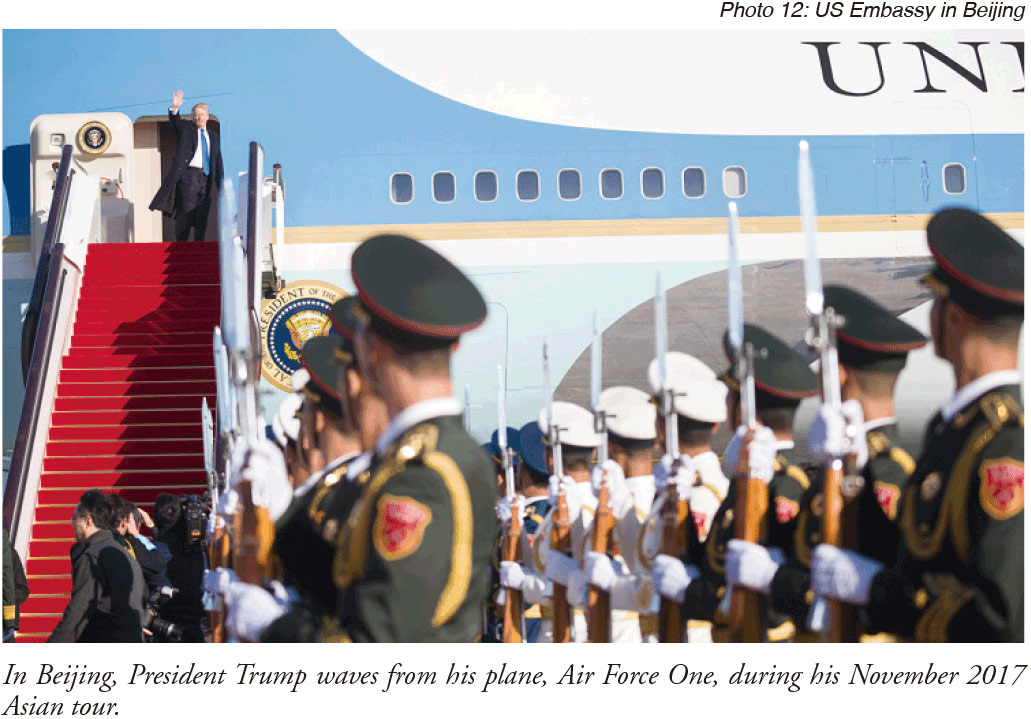
Throughout his first year in office, Trump has shown himself to be the perfect caricature of the ugly American. The world is learning to get used to a man known for avoiding diplomatic nuance and subtlety and speaking only in loud, direct, and angry tones. The world is also learning that like most businessmen, Trump likes to project an exaggerated image of himself and his personal success. As he wrote in his 1987 book The Art of the Deal, "The final key to the way I promote is bravado. I play to people's fantasies. People may not always think big themselves, but they can get very excited by those who do. That is why a little hyperbole never hurts. People want to believe that something is the biggest, the greatest and the most spectacular." But America's top public servant cannot conduct US foreign policy by simply playing to anyone's vanity - even his own.
And therein lies the major contradiction of this presidency. The overall success of any US president depends upon his ability to take a long-term view for the country and to conduct American diplomacy in a manner that leads to enduring political solutions beyond his term in office. Instead, Trump has followed his short-term businessman's formula, focusing squarely on style over substance and simply declaring success, threatening those who oppose his self-promoting impulses, and burnishing his deal-making credentials in order to grab headlines. His foreign trips in 2017 have shown that the more business deals he can announce - however tenuous in reality they may be - the more successful he can consider himself as president. After all, as he wrote back in 1987, "good publicity is preferable to bad, but from a bottom-line perspective, bad publicity is sometimes better than no publicity at all."
Trump's condescending and pompous language in describing America's free trade deals, calling them all "disasters" and publicly castigating previous US administrations on Twitter and on foreign state visits, demonstrate how poorly he understands their important long-lasting benefits to the US and how self-righteously he sees his mission to reshape the world around his perception of unbridled American power.
Trump's bellicose war of words and exchange of insults with Kim is another area for him to practice his bravado and demonstrate American strength - so long as he does not need to confront North Korea militarily! What would happen if Pyongyang actually believed an American military attack were imminent because of a menacing tweet by Trump?
Trump's ugly American diplomacy is one of arrogance simply because he sees other countries not as nations, but as customers which for too long have taken advantage of the US. If he decides to withdraw the US from NAFTA or KORUS, it will be done for purely selfish reasons and in the belief that eventually there will be other "customers" who will open their markets for American products. Already, following Trump's withdrawal from the TPP, the remaining 11 countries of the original pact are moving forward without the US which will in fact ensure US exports to those countries will compete at a disadvantage. And unlike President Kennedy in the 1960s who saw that the US needed to win the hearts and minds of people around the world, President Trump has clearly taken it for granted.
In this way, Trump's ugly American diplomacy is setting up US foreign policy for failure at this pivotal moment. China under Xi appears to be stepping up and winning this public relations battle, as many countries begin to second-guess Washington and turn toward Beijing for global leadership. Indeed, China's growing power and stature present the single greatest challenge to the current world order created by the US in the aftermath of World War II - and now in some ways so does the US under President Trump.
Japan SPOTLIGHT January/February 2018 Issue
(2018/02/19)
Constantine A. Pagedas
Constantine A. Pagedas is executive vice president and COO at International Technology and Trade Associates, Inc. (ITTA), a consulting company based in Washington, DC.

























